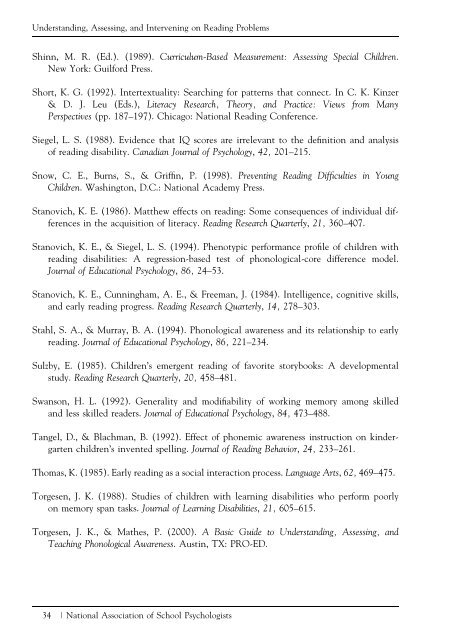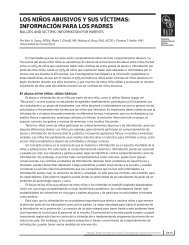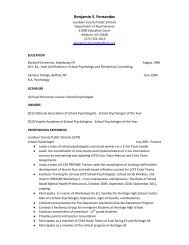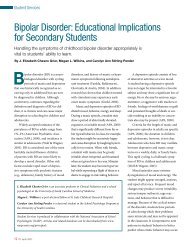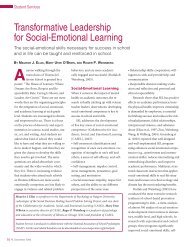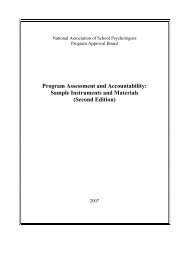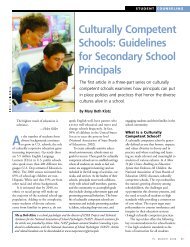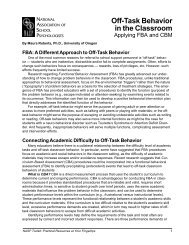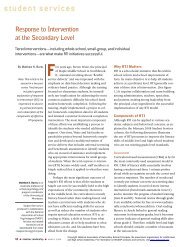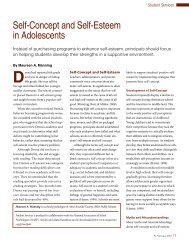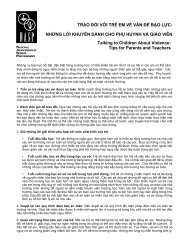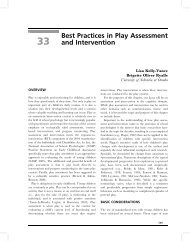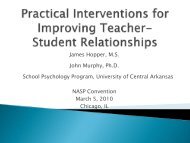Chapter 1 - National Association of School Psychologists
Chapter 1 - National Association of School Psychologists
Chapter 1 - National Association of School Psychologists
You also want an ePaper? Increase the reach of your titles
YUMPU automatically turns print PDFs into web optimized ePapers that Google loves.
Understanding, Assessing, and Intervening on Reading Problems<br />
Shinn, M. R. (Ed.). (1989). Curriculum-Based Measurement: Assessing Special Children.<br />
New York: Guilford Press.<br />
Short, K. G. (1992). Intertextuality: Searching for patterns that connect. In C. K. Kinzer<br />
& D. J. Leu (Eds.), Literacy Research, Theory, and Practice: Views from Many<br />
Perspectives (pp. 187–197). Chicago: <strong>National</strong> Reading Conference.<br />
Siegel, L. S. (1988). Evidence that IQ scores are irrelevant to the definition and analysis<br />
<strong>of</strong> reading disability. Canadian Journal <strong>of</strong> Psychology, 42, 201–215.<br />
Snow, C. E., Burns, S., & Griffin, P. (1998). Preventing Reading Difficulties in Young<br />
Children. Washington, D.C.: <strong>National</strong> Academy Press.<br />
Stanovich, K. E. (1986). Matthew effects on reading: Some consequences <strong>of</strong> individual differences<br />
in the acquisition <strong>of</strong> literacy. Reading Research Quarterly, 21, 360–407.<br />
Stanovich, K. E., & Siegel, L. S. (1994). Phenotypic performance pr<strong>of</strong>ile <strong>of</strong> children with<br />
reading disabilities: A regression-based test <strong>of</strong> phonological-core difference model.<br />
Journal <strong>of</strong> Educational Psychology, 86, 24–53.<br />
Stanovich, K. E., Cunningham, A. E., & Freeman, J. (1984). Intelligence, cognitive skills,<br />
and early reading progress. Reading Research Quarterly, 14, 278–303.<br />
Stahl, S. A., & Murray, B. A. (1994). Phonological awareness and its relationship to early<br />
reading. Journal <strong>of</strong> Educational Psychology, 86, 221–234.<br />
Sulzby, E. (1985). Children’s emergent reading <strong>of</strong> favorite storybooks: A developmental<br />
study. Reading Research Quarterly, 20, 458–481.<br />
Swanson, H. L. (1992). Generality and modifiability <strong>of</strong> working memory among skilled<br />
and less skilled readers. Journal <strong>of</strong> Educational Psychology, 84, 473–488.<br />
Tangel, D., & Blachman, B. (1992). Effect <strong>of</strong> phonemic awareness instruction on kindergarten<br />
children’s invented spelling. Journal <strong>of</strong> Reading Behavior, 24, 233–261.<br />
Thomas, K. (1985). Early reading as a social interaction process. Language Arts, 62, 469–475.<br />
Torgesen, J. K. (1988). Studies <strong>of</strong> children with learning disabilities who perform poorly<br />
on memory span tasks. Journal <strong>of</strong> Learning Disabilities, 21, 605–615.<br />
Torgesen, J. K., & Mathes, P. (2000). A Basic Guide to Understanding, Assessing, and<br />
Teaching Phonological Awareness. Austin, TX: PRO-ED.<br />
34 <strong>National</strong> <strong>Association</strong> <strong>of</strong> <strong>School</strong> <strong>Psychologists</strong>


